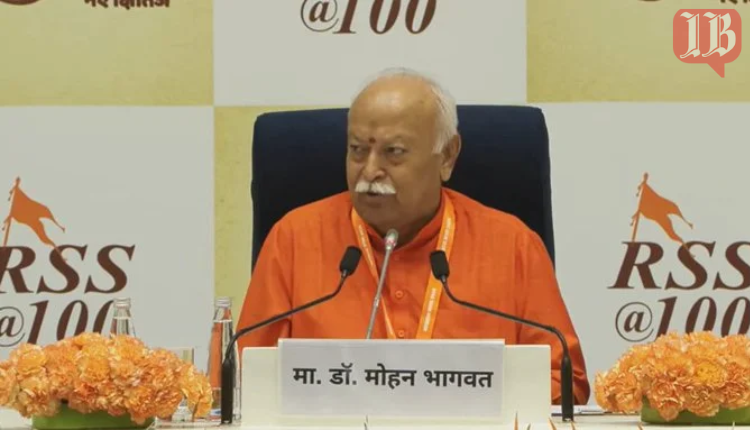New Delhi: As the Rashtriya Swayamsevak Sangh (RSS) marked its 100th year with a grand three-day event at Vigyan Bhawan, RSS chief Mohan Bhagwat delivered a powerful address that stirred discussions on education, population, retirement, and India’s cultural identity.
The event, themed ‘100 Years of RSS Journey: New Horizons’, drew thousands to reflect on the organisation’s legacy and its roadmap for a united, progressive India. On the final day, Bhagwat fielded questions from the audience, offering candid insights into pressing national issues, from the new education policy to the RSS’s ties with the BJP.
A Century Of Service And Vision
From August 26 to 28, the RSS celebrated its centenary with a series of lectures aimed at showcasing its contributions to society and clarifying its ideology. Bhagwat, the Sarsanghchalak, used the platform to articulate the organisation’s commitment to fostering a cohesive society rooted in Indian values. His remarks, delivered over two days of speeches and a final day of answering questions, touched on themes critical to India’s future, blending tradition with modernity.
Key Takeaways From Bhagwat’s Address
Education as a Tool for Values: Bhagwat endorsed the National Education Policy, emphasising its holistic, five-layered approach (panchkoshiya shiksha). “Education isn’t just rote learning; it’s about instilling values,” he said, stressing that technology and modernisation must coexist with etiquette and cultural roots. He cautioned against humans becoming slaves to technology, advocating for education that nurtures character.
Cultural Nuances In Global Contexts: Addressing the trend of teaching ‘drinking etiquette’ for international assignments, Bhagwat questioned its necessity for Indians. “We are not British, nor should we aspire to be. Learning a language is fine, but generalising foreign customs isn’t needed,” he remarked, urging a balance between global engagement and cultural pride.
Population And Sustainability: On birth rates, Bhagwat advocated for families to have at least three children, citing medical advice that it benefits health and teaches children to adjust. However, he stressed moderation, noting, “Three is enough; more isn’t necessary.” He linked this to maintaining a sustainable population for India’s future.
Retirement Myths Clarified: Addressing speculation about retirement at 75, Bhagwat dismissed the idea, referencing late RSS leader Moropant Pingle’s views but clarifying, “I never said I’d retire, nor should anyone else be forced to. As long as the Sangh needs us, we serve.” This put to rest rumours about his comments targeting political figures.
RSS-BJP Coordination: Responding to questions about coordination with the BJP, Bhagwat clarified, “We maintain good relations with every government. Differences of opinion exist, but there’s no discord. The BJP makes its own decisions, and we assist when asked.” He dispelled notions that the RSS dictates party policies.
Curbing Illegal Migration: Bhagwat called for stricter measures against illegal migration, stating, “Entry without permission is wrong and must be stopped. Jobs in our country should go to our people, including Indian Muslims, whose livelihoods are also affected.” He framed this as a matter of national interest, not religion.
Debunking Militancy Allegations: Addressing accusations of militancy, Bhagwat said, “Such claims have been made for years, but there’s no proof. The RSS unites through pure, selfless love, not violence. We strive for an inclusive society, not hierarchy.”
Cultural Unity Over Division: On religion and identity, Bhagwat asserted, “Hindu or Hindavi, it’s the same. Hindu, Muslim — all share the same culture and ancestors. Only worship differs. Islam is here and will stay; this is the Hindu way of thinking.” He urged mutual trust to bridge divides, suggesting place names honour patriotic Muslims like Dr Abdul Kalam, not invaders.
Self-Defence, Not Aggression: Responding to queries about the RSS’s focus on strength, Bhagwat clarified, “Our exercises aren’t for attacking others but for self-defence. If other nations prepare for war, shouldn’t we at least protect ourselves?” He noted that terms like ‘Hindu Rashtra’ clarify India’s identity without causing confusion.
Kashi And Mathura Stance: On demands for temples in Kashi and Mathura, Bhagwat said, “The RSS was directly involved only in the Ram Mandir movement. We don’t join other agitations, though our volunteers may participate as individuals.” This underlined the RSS’s selective engagement in movements.
A Roadmap for India’s Future
Bhagwat’s address painted a vision of an India that embraces its cultural roots while navigating modern challenges. His emphasis on education reform, population balance, and social harmony resonated with the RSS’s mission to build an organised, inclusive society. By addressing misconceptions about the organisation’s ideology, he sought to bridge divides and foster dialogue.
As the RSS steps into its second century, Bhagwat’s words serve as both a reflection on its legacy and a call to action for a united, self-reliant India. The event, attended by thousands, including intellectuals, diplomats, and political leaders, underscored the organisation’s enduring influence in shaping India’s social and cultural fabric.



Comments are closed.